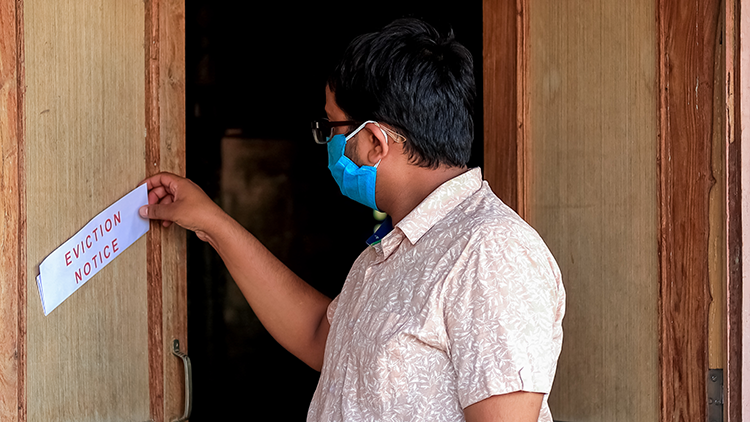Appeals court allows eviction moratorium to continue, says CDC likely to win appeal

Image from Shutterstock.
A federal appeals court on Wednesday refused to interfere with an eviction moratorium imposed by the U.S. Centers for Disease Control and Prevention to help stop the spread of COVID-19.
The U.S. Court of Appeals for the District of Columbia Circuit allowed the eviction ban to remain in place pending an appeal. The court’s June 2 order said the eviction ban was likely to be upheld on the merits.
The CDC eviction moratorium applies to tenants unable to pay full rent because of a loss of income or extraordinary medical expenses. Those protected may earn no more than $99,000 as an individual or no more than $198,000 per household. And eviction would likely render the tenants homeless or living in close quarters in a congregate setting.
Landlords can still begin eviction proceedings against those protected by the moratorium, but enforcement of removal orders is stopped, the appeals court said. And the obligation to pay rent continues.
The CDC ordered the eviction ban after expiration of a federal law banning evictions at rental properties receiving federal assistance. Since then, Congress extended the CDC’s broader ban by 30 days, and the CDC extended its ban twice. The ban ends June 30.
The CDC had issued the eviction ban under the Public Health Service Act, which authorizes the CDC, with approval from the secretary of the Department of Health and Human Services, to make and enforce regulations to stop the spread of communicable diseases between states.
Section 264(a) of the law says the HHS secretary may, for the purpose of carrying out the regulations, “provide for such inspection, fumigation, disinfection, sanitation, pest extermination, destruction of animals or articles found to be so infected or contaminated as to be sources of dangerous infection to human beings, and other measures, as in his judgment may be necessary.”
U.S. District Judge Dabney L. Friedrich of the District of Columbia had ruled last month that the CDC did not have authority to impose the moratorium under federal law. She said an eviction moratorium is different in nature than inspecting, fumigating, disinfecting, sanitizing, exterminating or destroying.
But the D.C. Circuit said Section 264(a) used “language of expansion, not contraction, designed to strengthen HHS’s ability to take the measures determined to be necessary to protect the public health from the dangers posed by contagious diseases that respect no boundaries.”
“To be sure, HHS has not previously imposed a rental eviction moratorium under Section 264,” the appeals court said. “But no public health crisis even approaching the scale and gravity of this one has occurred since the Public Health Service Act was passed in 1944.”
The suit challenging the ban was brought by rental property managers, the Alabama Association of Realtors and the Georgia Association of Realtors. The case is Alabama Association of Realtors v. U.S. Department of Health and Human Services.
Another federal appeals court, the 6th U.S. Circuit Court of Appeals at Cincinnati, issued a decision in March that sided with plaintiffs challenging the ban.
Hat tip to Reuters and Law360, which covered the appellate decision.
Write a letter to the editor, share a story tip or update, or report an error.


